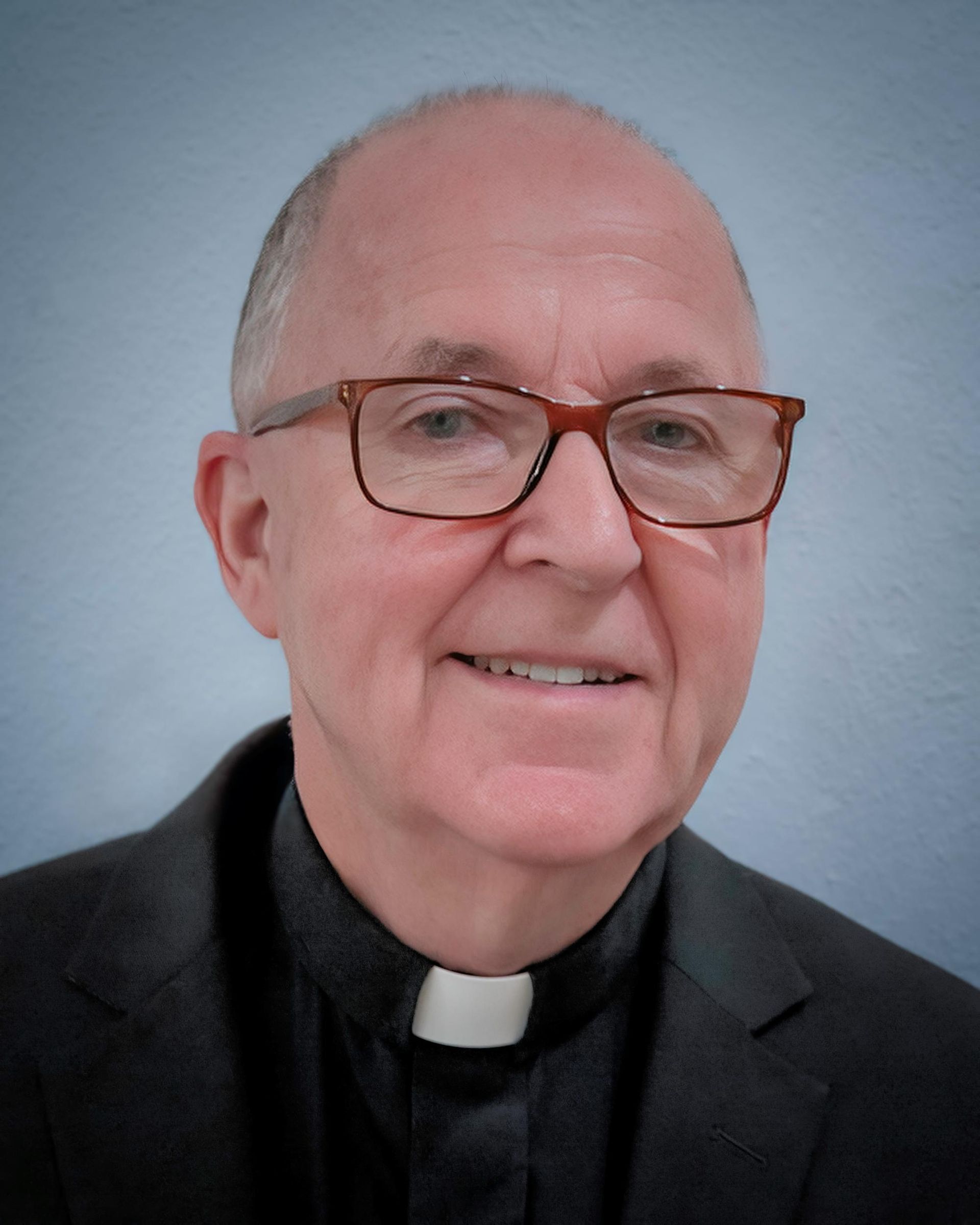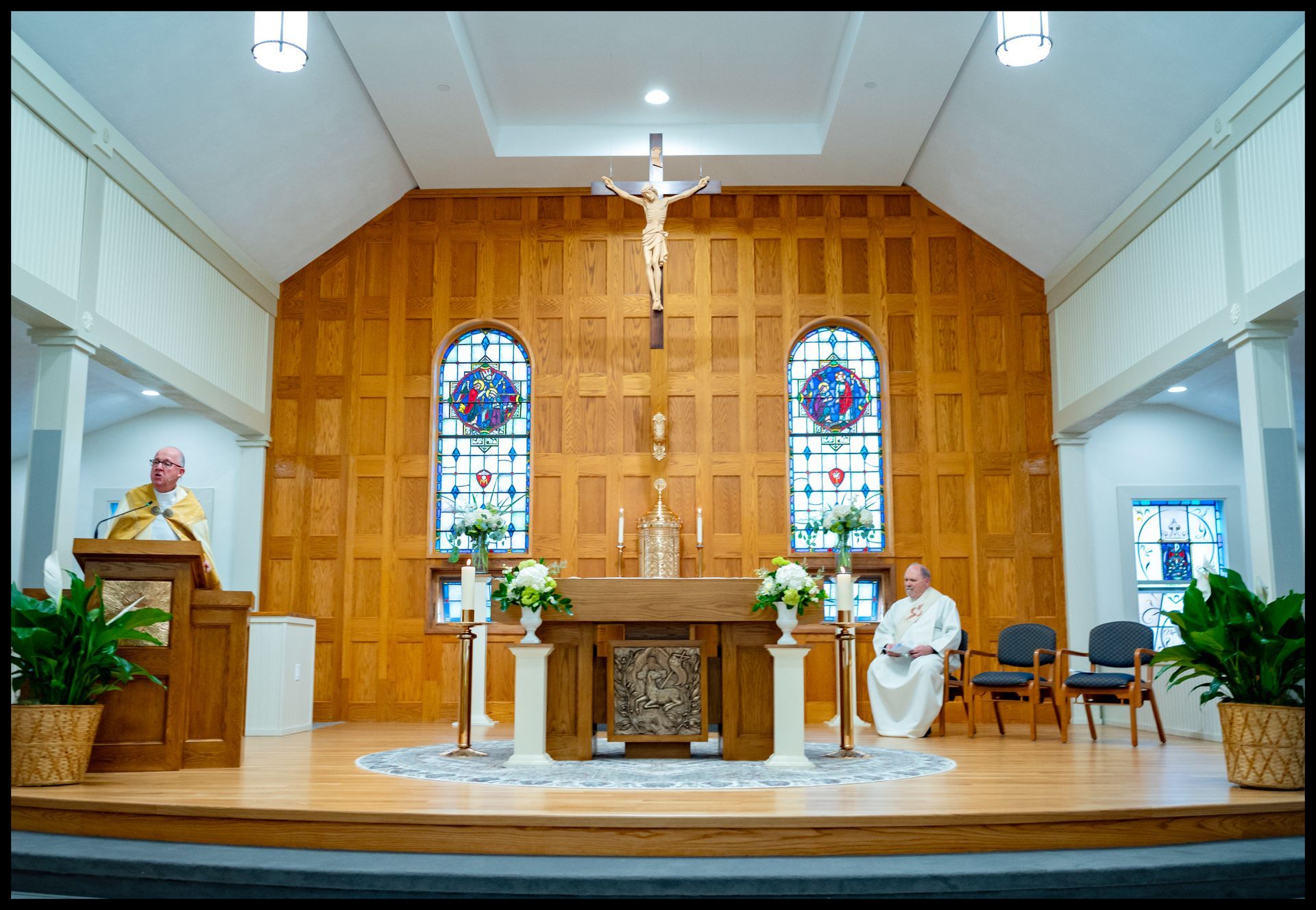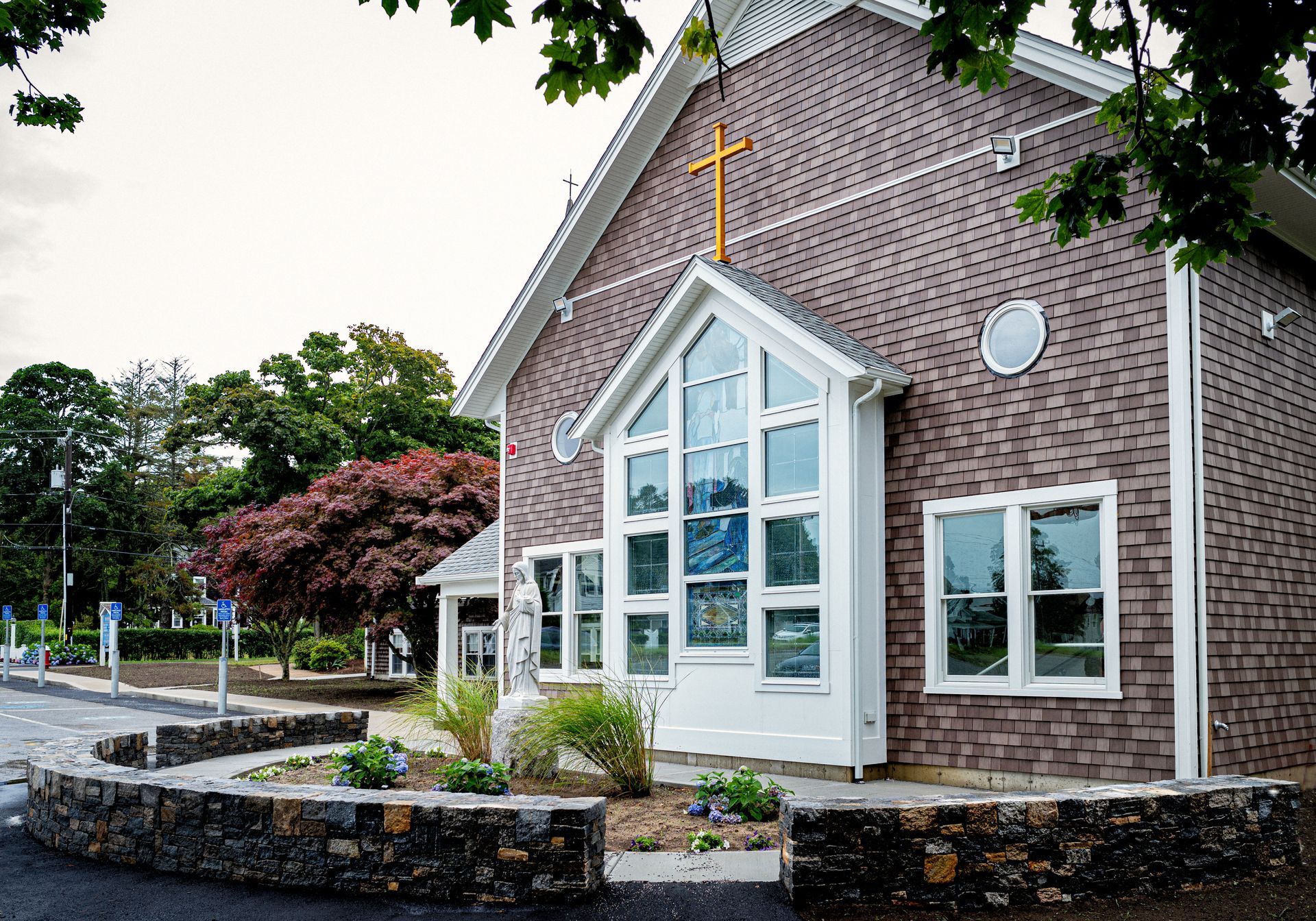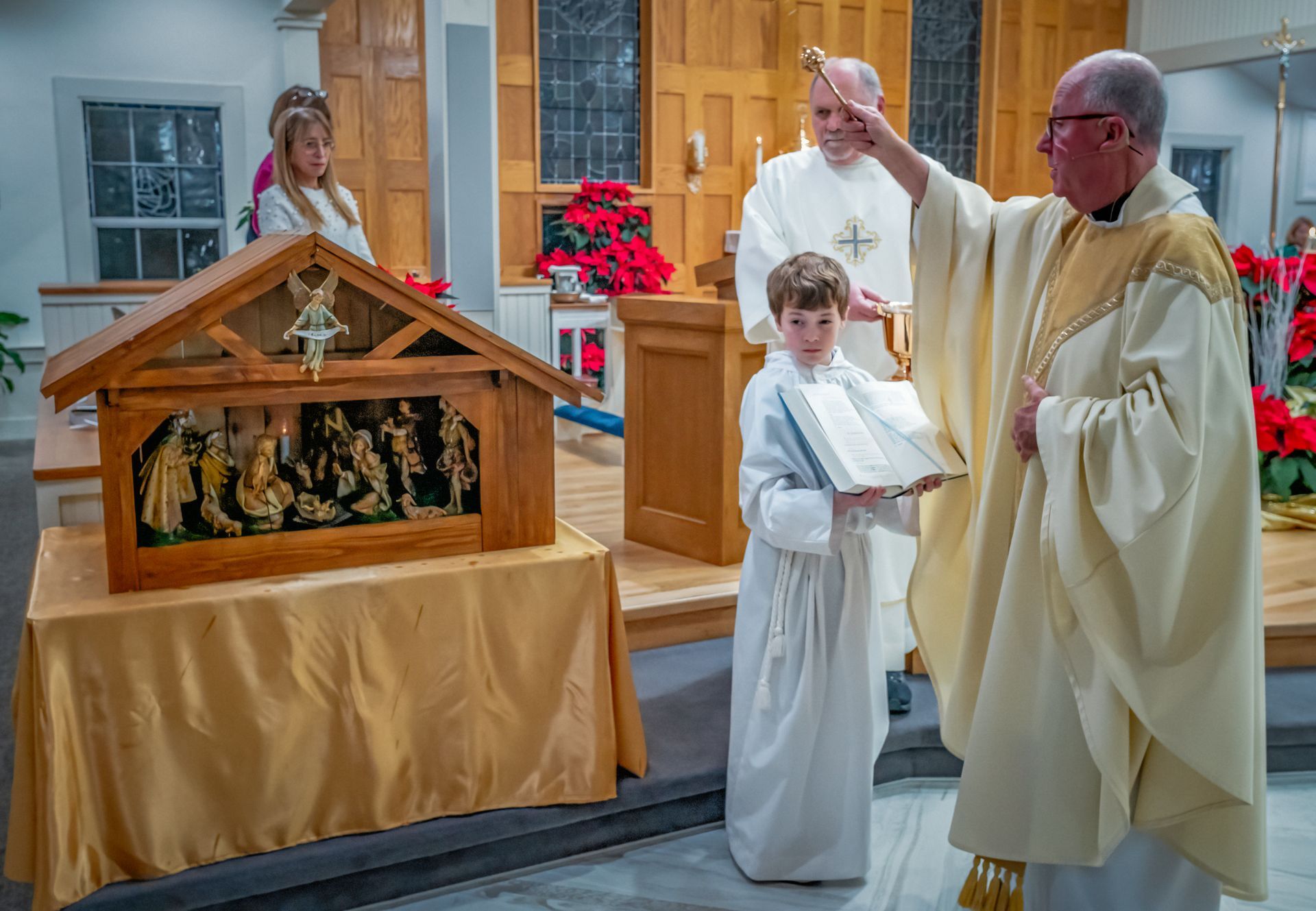Baptism of the Lord Homily
The Baptism of the Lord- Homily by Deacon Art LaChance
Soon after the explosions at the finish line of the 2013 Boston Marathon, a video of the tragic moment appeared on The Boston Globe website.
Runners in the marathon are jogging across the finish line and everyone is cheering. There is a sudden clap of thunder and an orange bloom of fire from within a ring of flags honoring the nations represented in the race. It is followed, seconds later, by another blast from just down the street.
The cheers become shrieks and high-pitched shrills of panic and fear.
The cameraman carries us forward, to where the smoke is drifting and police, runners and bystanders rip barricades apart trying to reach the center of the chaos.
"We need help!" someone cries.
And the cameraman whispers three words to himself, "Oh, my God," he says. He says it again. "Oh, my God. "He keeps saying it – "Oh, my God."
In a moment of pain, lamentation and loss — on an afternoon that required a presidential expression of empathy and resolve — on a day filled with expert analysis and speculation — no one said words more fitting than those.
Oh, my God — because blood pooled on the sidewalk.
Oh, my God — because broken and twisted bodies covered the ground.
Oh, my God — because our nightmare had become our reality.
I don’t know if the cameraman was even aware of what he was saying. But, to me it is clear that, in a moment of death and devastation, as he peered through the lens of his camera, he peered also through the lens of faith – and, whether conscientiously or sub-conscientiously, he recognized a greater wisdom, a nurturing presence, intertwined with his own – that led him, and us to a new place of grace.
Can the same be said of our tragedies?
When the ambulance takes our child or the disease takes our spouse? When the economy takes our retirement or the two-timer takes our heart — can we, like the camera man, find God in the crisis?
We can! — if we are prepared for it.
This is the second week of our series for the new year. We’re talking about the “unexpected” in life.
This is important because God wants to use the circumstances of our lives to grow our faith.
In fact, it is exactly in times of the unexpected, that God can work most effectively because he’s got our attention. C. S. Lewis describes something of this paradox when he says: “God whispers in our pleasures, speaks in our conscience, but shouts in our pains…”
In our homily series we are looking at how to prepare for the unexpected and what to do with it once it inevitably arrives — Because, it is a key factor in growing in faith.
Last week, Father introduced two: First, people who grow in faith in unexpected circumstances grow because they’re connected to the community. Second: People who build their faith in unexpected circumstances see the problem as an opportunity to grow.
Today, we add to that list: People who grow in faith in unexpected circumstances accept the reality that God is good — even when life is not.
Some people come to problems or pain and believe that somehow discounts God’s goodness or competence. It’s human nature to want to blame someone for our troubles — And it’s okay to blame God — He can handle it. You can get mad at God — He can take your anger. But, the presence of suffering does not discount God’s goodness or love.
God never intended for us to suffer. He created a world without pain, death and grief. God gave us the freedom to choose to love him — which also gave us the freedom to reject him. God's goal was always relationship — not obedience.
It was the choice of Adam and Eve to reject God that brought sin into the world. It is sin that brought suffering into God's perfect world. God’s answer to sin is Jesus!
As we heard in our second reading: “When the kindness and generous love of God our savior appeared … he saved us through the bath of rebirth and renewal by the Holy Spirit, whom he richly poured out on us through Jesus Christ our savior, so that we might be justified by his grace and become heirs in hope of eternal life.”
God sends his Son to bring justice to an unjust world. God sends Son to bring healing to a broken world. Jesus is — as Isaiah was inspired to proclaim — the Servant who is gentle with the bruised and beaten. Even though suffering is all around us, we can have faith in a good God who truly cares, and trust Him to be at work in our pain.
This is why it is so important to spend time with the Bible — Why it is so paramount for us to be here.
This is why participation in Small Groups is far reaching.
We need to hear that God is still in control.
We need to hold dear that it’s not over until God says so. We need to be reminded that life’s mishaps and tragedies are not a reason to bail out — They are a reason to hold tight.
God’s Word is God’s cure for a broken heart, a broken body, a broken life. We can invite God into our suffering to give us comfort and peace, to make us better, not bitter. And then we need to share what we know with others.
Which leads us to our fourth lession: People who grow in faith in unexpected circumstances identify opportunities to use their pain to help others.
The Gospel highlights Jesus’ specialness as God’s beloved. While the divine voice at Jesus’ baptism is directed to him, “You are my beloved Son,” Luke has added “all the people” to the scene. In this way, Luke hints that they, too, experience the delight of God in them, as they are washed clean, newly born and favored.
As we recall our own baptism, we know that we, too, have been in that thin space where “heaven was opened” and the barrier between humanity and divinity is dissolved.
With Jesus’ taking on human flesh and then inviting us to partake of his flesh and blood, the special place he holds in God’s affection is extended to all of us.
That God is partial to each of us is something startling. This divine favor causes wonder and also carries with it a mission.
In the first reading, Isaiah elaborates the mission entrusted to a chosen servant: to bring forth justice.
In biblical lingo, justice does not imply that everyone gets what he or she deserves.
Rather, it signifies that those who know themselves to be favored by God undeservedly have been empowered by the Spirit to be light — to speak truth — and to be compassionate to those who feel like “a bruised reed,” fanning into flame the spark of God’s love wherever a smoldering wick is found.
In the wake of every unexpected event — be it acts of violence, natural disaster, or personal travesty — we will always find people who are helping. Images from the Marathon bombings show bystanders and first responders rushing in without regard for personal safety.
On the street corners, people with fallen hearts and teary eyes embraced people they did not know. In churches, synagogues and mosques people gathered to seek release from pain or simply to whisper again and again: Oh, my God! In hospital waiting rooms, strangers lent one another strength.
In my years of hospital work and ministry, I feel blessed each time I witness such compellingly clear manifestations of faith. The Holy Spirit permeates the shock, sadness, and fears that accompanies brutal cruelty, and shows as a gentle and loving gateway to faith, hope, and life in Christ.
Ultimately, this is the story about the continual mission of Christ who came, and comes, to seek and heal in love. It is a story of faithful discipleship, offering prayer and physical assistance in times of need. And it is the story of the harmony of members of Christ’s body united in fulfilling the Church’s great mission.
It is our story. To build up the Body of Christ — to promote the reign of God — to help others draw closer to God.
Because — sometimes in the unexpected – Oh, my God – words and tears are not enough.






